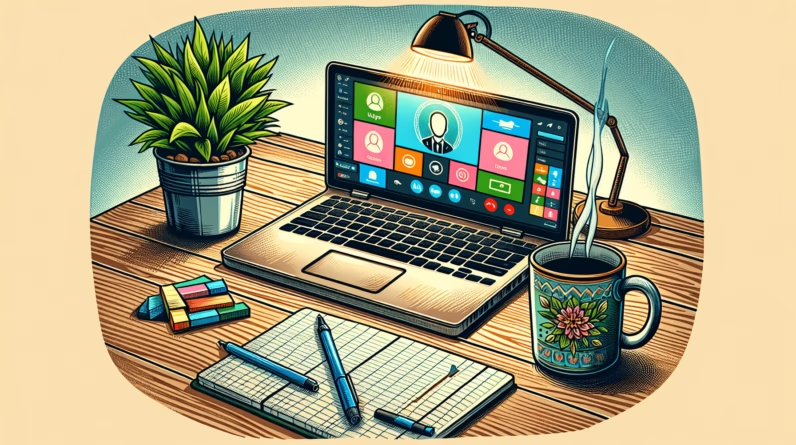
Have you ever found yourself staring blankly at your screen, struggling to concentrate while working remotely? You’re not alone. Many individuals face unique distractions when working from home, and it can make staying focused feel like an uphill battle. Fortunately, several strategies can help you boost your productivity. Let’s take a closer look at how you can improve your focus and make the most of your remote work situation.
Table of Contents
Understanding the Remote Work Environment
Remote work offers both flexibility and freedom; however, it also presents challenges that can impede your ability to concentrate. A cozy home setup can quickly turn into a distraction-laden environment. Understanding this is the first step in creating a focused workspace.
The Impact of Distractions
When you’re in an office, the environment is tailored for productivity. At home, however, distractions can arise from various sources. There might be household chores, family members, or even the lure of the television. Identifying these distractions is crucial for finding ways to minimize them.
Creating the Perfect Workspace
Your workspace heavily influences your ability to concentrate. By optimizing this area, you can create an environment that enhances your focus.
Selecting an Appropriate Location
Choose a spot in your home that is quiet and free from disturbances. Ideally, this should be a separate room or at least a secluded corner where you can minimize interruptions. This physical separation helps signal to your brain that it’s time to work.
Ergonomic Considerations
Comfort is key to maintaining your focus. Invest in a good chair and desk that support your posture. An ergonomic setup not only makes you feel better physically but can also boost your concentration. Ensure your monitors are at eye level and that your keyboard and mouse are easily accessible to prevent strain.
Structuring Your Workday
Establishing a solid routine is essential for success when working remotely. Consider using time management strategies to keep you on track throughout the day.
The Importance of a Schedule
Creating a daily schedule helps you allocate time efficiently for various tasks. This not only provides structure but also helps you set boundaries. By defining your work hours clearly, you can mentally separate work from personal time.
Time Blocking Method
One effective method for managing your time is called “time blocking.” This technique involves breaking your day into focused segments for specific tasks. For example, you might set aside 9 AM to 11 AM for project work and then take a break. This method can foster a stronger sense of accountability and purpose throughout your day.
Incorporating Breaks
Though it might seem counterintuitive to take breaks when you’re trying to focus, short breaks are essential. The Pomodoro Technique is a great way to implement this. Work for 25 minutes, then take a 5-minute break. After completing four pomodoros, take a longer break of 15 to 30 minutes. This approach helps to maintain energy and focus throughout your work session.

Get Tools To Boost Remote Productivity
Leveraging Technology
Various tools can support your efforts to stay focused while working remotely. Learning how to leverage technology effectively can increase your productivity.
Project Management Tools
Using project management tools like Trello, Asana, or Monday.com can help you organize tasks and track progress. These platforms allow you to see your workload clearly and prioritize your tasks effectively.
Time Tracking Software
To become more aware of how you spend your time, consider using time tracking software. Tools like Toggl or RescueTime provide insights into your work habits, allowing you to identify patterns in your focus and productivity. This information can help you make informed decisions about adjusting your schedule or environment.
Communication Tools
Maintaining clear communication with your team is vital when working remotely. Utilize tools like Slack, Microsoft Teams, or Zoom to stay connected. Regular check-ins can help you remain accountable to your goals and keep team collaboration flowing smoothly.
Minimizing Digital Distractions
Technology provides numerous distractions that can derail your focus when working remotely. Learning how to manage these distractions effectively can bolster your concentration.
Limiting Social Media Use
Social media can be a significant productivity killer. Consider limiting your access during work hours. You might use browser extensions like StayFocusd or Freedom that help restrict your access to distracting websites. Creating specific times for social media checks can help you stay connected without losing focus during work hours.
Mute Non-Essential Notifications
Turning off unnecessary notifications can help maintain your focus. Whether these are from apps on your phone or desktop, you can help minimize your chances of being distracted. Consider setting aside specific times to check your emails and messages rather than responding to every notification as it comes.
Practicing Mindfulness
Incorporating mindfulness techniques can enhance your ability to focus and reduce stress, ultimately improving your productivity.
Mindful Breathing Techniques
Take a few moments throughout your day to practice mindful breathing. Deep breathing exercises can calm your mind and ground you. This simple practice can help clear your thoughts, allowing you to return to work with renewed focus.
Meditation Sessions
Setting aside time for meditation can greatly enhance your ability to concentrate. Even a few minutes a day can provide mental clarity and reduce feelings of overwhelm. Consider using apps like Headspace or Calm to guide you through meditative practices.

Prioritizing Health and Well-being
Your physical and mental well-being directly impacts your focus and productivity. It’s essential to prioritize self-care, even in a remote work environment.
Regular Exercise
Incorporating physical activity into your daily routine can help you maintain energy levels and reduce stress. Whether it’s a workout, a walk, or yoga, find an activity you enjoy and aim to do it consistently. Exercise releases endorphins, which can improve your mood and concentration.
Healthy Eating Habits
Your diet plays a crucial role in how you feel and function throughout the day. Opt for balanced meals and snacks that fuel your body and mind. Foods rich in omega-3 fatty acids, antioxidants, and complex carbohydrates can boost cognitive function.
Staying Hydrated
Don’t forget to drink enough water! Staying hydrated helps maintain energy levels and focus. Keep a water bottle at your desk as a gentle reminder to sip throughout the day.
Setting Boundaries
Maintaining a healthy work-life balance is vital, especially when working from home. Setting boundaries can help you stay focused and avoid burnout.
Define Work and Non-Work Hours
Communicate your work hours to colleagues, friends, and family. Being clear about your schedule helps others respect your working time, minimizing interruptions during critical focus periods.
Create a Shutdown Ritual
At the end of your workday, having a shutdown ritual can signal to your brain that the workday is over. This could involve tidying your workspace, creating a to-do list for the next day, or engaging in a brief mindfulness practice. These actions create a clear boundary between work and personal time.
Engaging with Colleagues
Staying connected with co-workers can enhance your focus and motivation. Building relationships in a remote work environment fosters a sense of community.
Regular Check-Ins
Schedule regular check-ins or virtual coffee breaks with your colleagues. This practice helps maintain social interactions and provides an opportunity to discuss work, share ideas, and celebrate wins.
Team Collaboration
Collaborating with teammates on projects can encourage accountability and motivation. Set up regular brainstorming sessions or collaborative problem-solving meetings to drive engagement and creativity.
Continuous Learning and Improvement
Taking the time to reflect on your working habits can lead to sustainable improvement in your focus and productivity.
Evaluate What Works for You
Make it a habit to assess your productivity regularly. What strategies are effective? What needs adjustment? By evaluating your habits and outcomes, you can adapt your approach to suit your needs better.
Seeking Feedback
Don’t hesitate to seek feedback from peers and supervisors. Constructive criticism can provide valuable insights into areas where you can improve. Regular feedback fosters personal growth and enhances your ability to adapt to remote work demands.
Adjusting to Your Workflow
Every person is unique, and your workflow should reflect that. Understanding your preferences and work style can significantly impact your focus.
Identify Your Most Productive Hours
Pay attention to when you feel most productive during the day. If you find you work best in the morning, prioritize your most challenging tasks during this time. Conversely, save less demanding tasks for when your energy dips.
Tailor Your Strategies
Experiment with various strategies to find what aligns best with your personal work style. From adjusting breaks to changing your workspace setup, fine-tune your approach until you discover patterns that work for you.
Embracing Flexibility
One of the most significant benefits of remote work is flexibility. Embrace it by adjusting your strategies to fit your needs.
Adapt to Your Circumstances
If something isn’t working, feel empowered to change it. Maybe you need to switch locations, alter your schedule, or even find new tools to support your needs. Being adaptable will not only help improve your focus but also allow you to thrive in a remote setting.
Celebrate Small Wins
Acknowledge your progress, no matter how small. Celebrate completed tasks or effective strategies that worked for you. Recognizing these accomplishments boosts morale and encourages you to maintain your focus moving forward.
Conclusion
Losing focus while working remotely is a common challenge that can be addressed with intentional strategies. By understanding your environment, creating a structured workday, leveraging technology, and prioritizing your well-being, you can significantly improve your productivity. Remember that focusing is a skill that can be cultivated over time, so be patient with yourself as you implement these changes. With dedication and effort, you’ll not only enhance your focus but also find joy in your remote work experience.







